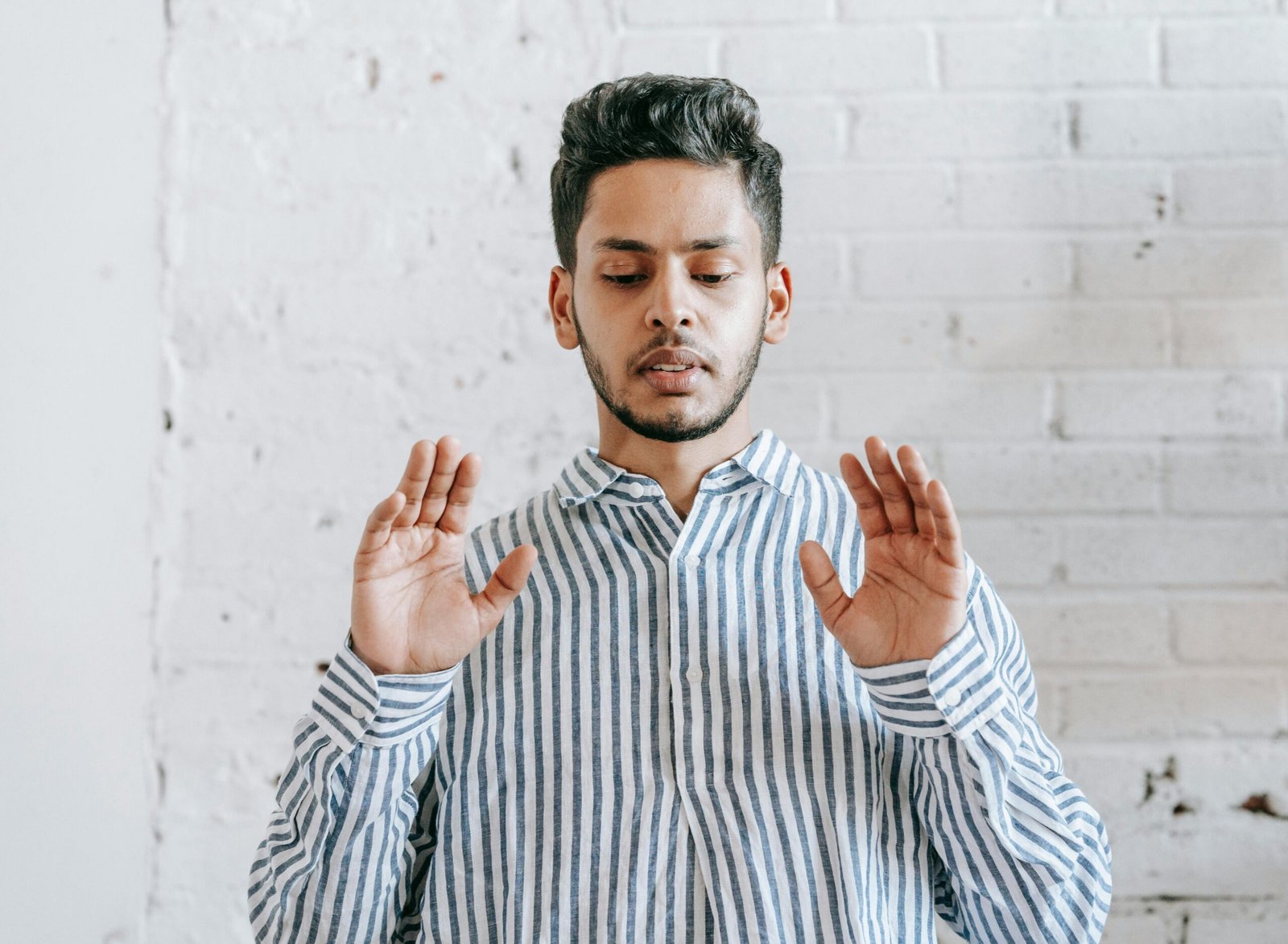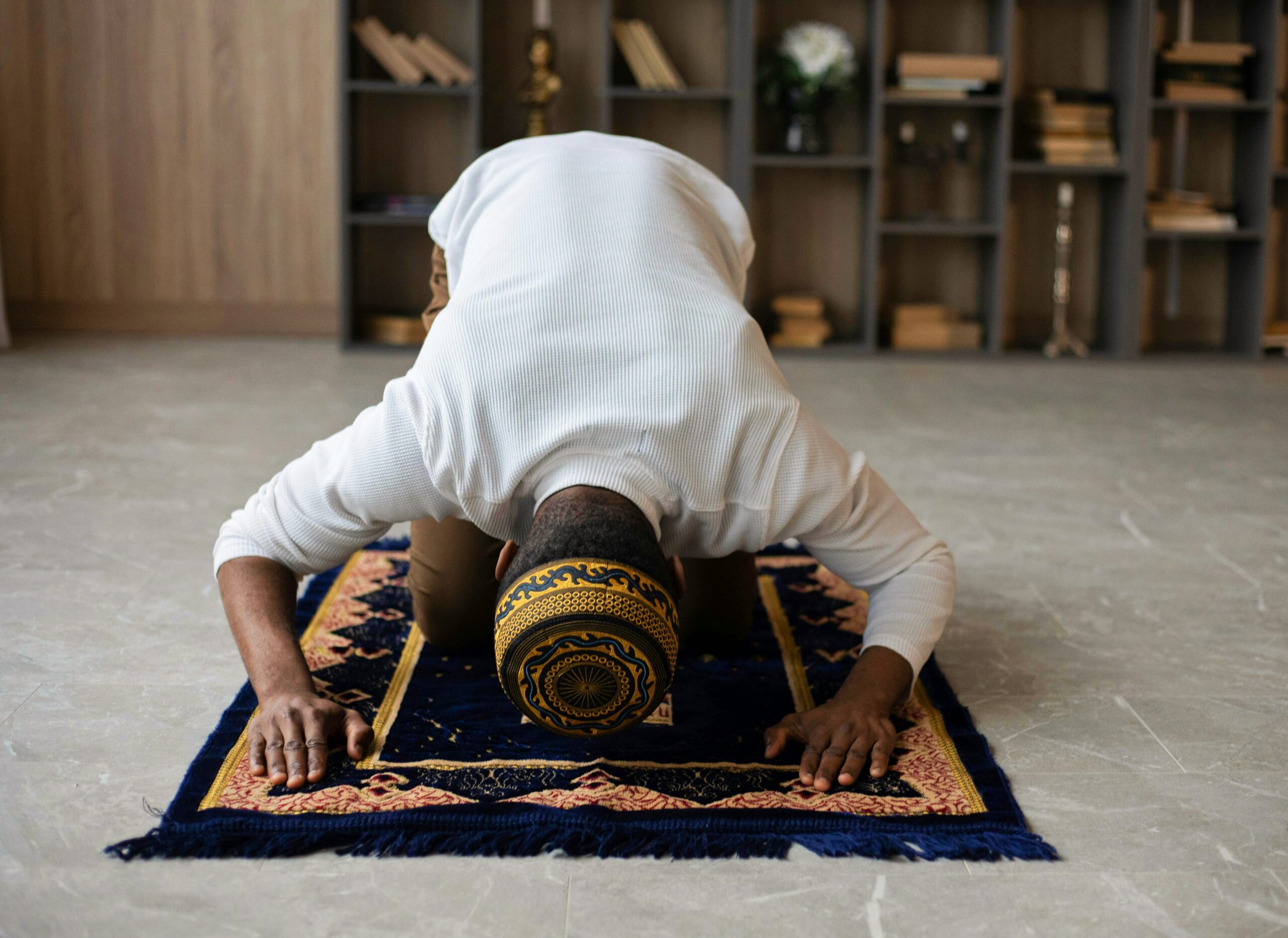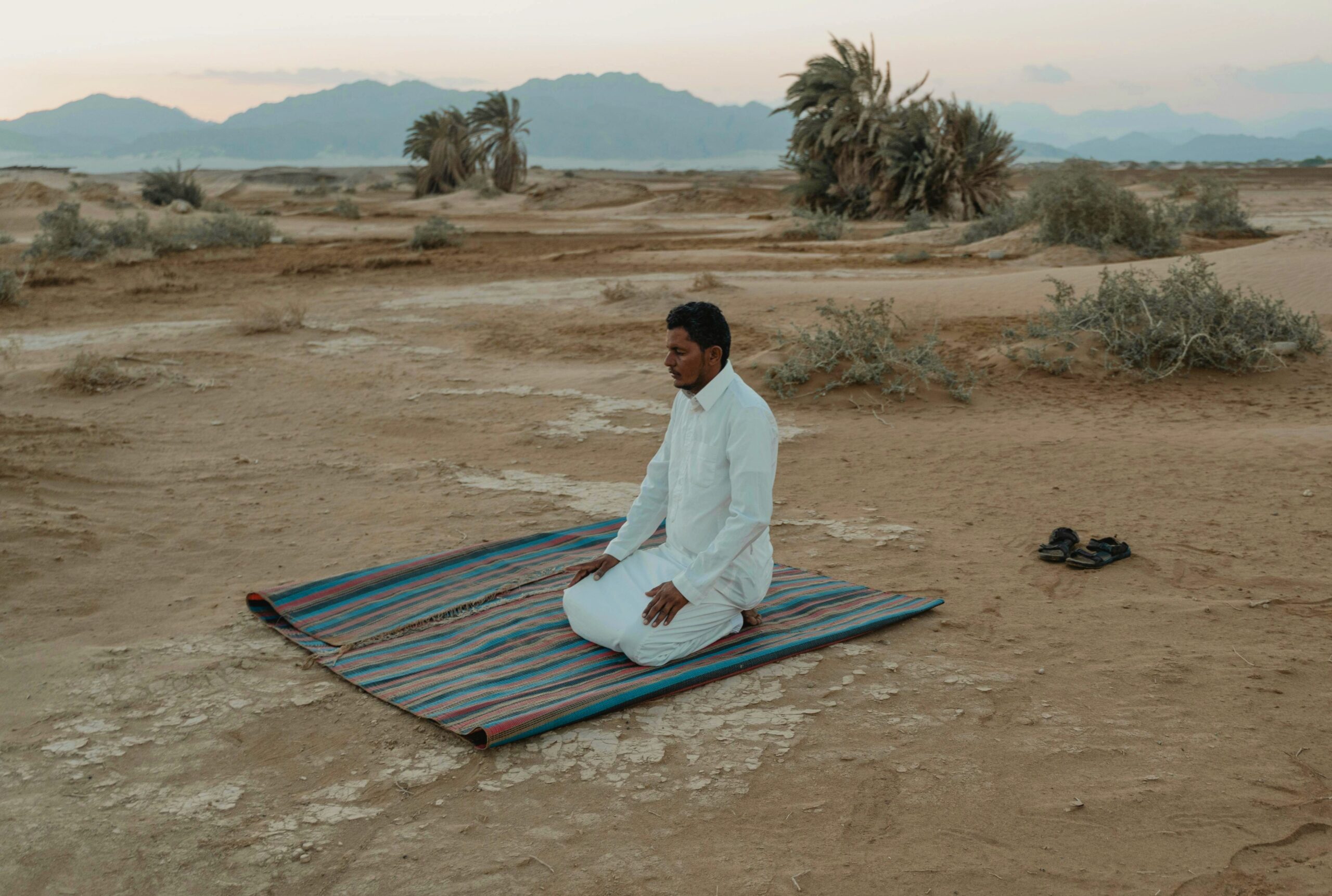Prayer is the most important pillar after the two shihada and it’s the pillar of religion, so the most important thing that a Muslim should take care of in his life is to continuously improve his prayer and deal with it as if it’s his life project. It’s important to be keen on humility in every obligatory prayer (Faridah) so that he doesn’t miss out on a lot of reward and reward, so Sheikh Saleh Academy explains to you in this article how to pray 4 rakat.
A Step-by-Step Guide to Praying 4 Rakats
There are several basic steps that explain how to pray 4 rakat correctly and this is shown in the following:
(1) Niyyah (Intention) & Takbeer

When talking about how to pray 4 rakat, the first step is the Niyyah “intention”, as it’s considered obligatory in any prayer and its place is the heart. After Wudu, the Muslim turns towards the Qiblah and begins to glorify Allah SWT by raising his hands to the ears and when he says “Allah Akbar” which means “Allah is great”, he must forget all his worries and problems and focus only on God who is greater than everything.
قال الرسول صلى الله عليه وسلم “إِنَّمَا الأَعْمَالُ بِالنِّيَّاتِ، وَإِنَّمَا لِكُلِّ امْرِئٍ مَا نَوَى”
Innamā al-aʿmālu bin-niyyāt, wa innamā li-kulli imriʾin mā nawa.
Prophet Mohammed PBUH says: “Actions are judged by intentions, and every person will have only what they intended.”
(2) Thana & Ta’awwz
First, you can read the opening supplication, and there are several formulas for it, including:
«سُبْحَانَكَ اللَّهُمَ وَبِحَمْدِكَ، وَتَبَارَكَ اسْمُكَ، وَتَعَالَى جَدُّكَ، وَلاَ إِلَهَ غَيْرُكَ»
Subḥānaka Allāhumma wa biḥamdika, wa tabāraka ismuka, wa taʿālā jadduka, wa lā ilāha ghayruk.
“Glory is to You, O Allah, and praise is Yours. Blessed is Your Name, and exalted is Your Majesty. There is no deity but You.”
You can seek refuge in Allah from the accursed Satan so that he has no influence on your prayer.
(3) Tasmiyah
Say “بسم الله الرحمن الرحيم” “Bismillah ar-Rahman ar-Raheem” which means”In the name of Allah, the Most Gracious, the Most Merciful”. It’s considered the first verse of Surah Al-Fatihah, and because of it, mercy and blessings descend upon you, and this is very necessary to clarify how to pray 4 rakat.
A theme that may pique your curiosity: How long does prayer last for muslim?
(4) Recite Surah Al-Fatiha

Reciting Al-Fatihah is an essential pillar of prayer and it isn’t accepted without it. Every Muslim should learn to recite it correctly and it’s one of the most important pillars of prayer:
بِسْمِ اللَّهِ الرَّحْمَٰنِ الرَّحِيمِ* الْحَمْدُ لِلَّهِ رَبِّ الْعَالَمِينَ* الرَّحْمَٰنِ الرَّحِيمِ* مَالِكِ يَوْمِ الدِّينِ* إِيَّاكَ نَعْبُدُ وَإِيَّاكَ نَسْتَعِينُ* اهْدِنَا الصِّرَاطَ الْمُسْتَقِيمَ* صِرَاطَ الَّذِينَ أَنْعَمْتَ عَلَيْهِمْ غَيْرِ الْمَغْضُوبِ عَلَيْهِمْ وَلَا الضَّالِّينَ*
Bismillah ar-Rahman ar-Raheem, Alhamdu lillahi Rabbil ‘alameen, Ar-Rahman ar-Raheem, Maliki yawmi-deen, Iyyaka na’budu wa iyyaka nasta’een, Ihdinas-sirat al-mustaqeem, Siratal-ladhina an’amta ‘alayhim ghayril-maghdoobi ‘alayhim wa lad-dalleen.
In the name of Allah, the Most Gracious, the Most Merciful. All praise is due to Allah, Lord of all the worlds. The Most Gracious, the Most Merciful. Master of the Day of Judgment. You alone we worship, and You alone we ask for help. Guide us to the straight path—the path of those who have earned Your favor, not of those who went astray.
Then say “Amen”, meaning O Allah, answer.
If you are wondering can I pray in English Islam, then it’s not permissible to pray except in Arabic, especially Surat Al-Fatihah, and the new Muslim can translate the supplications into English so that he learns the Arabic language.
(5) Recite Any Other Surah
It’s Sunnah for a Muslim to recite a short Surah or whatever is easy from the Quran in the first two Raka’at of the four-rak’ah prayer, which explains how to pray in Islam.
Some people ask: Which Surah to Recite in Duha Prayer? Any Surah can be chosen for this prayer, and there is no specific Surah, as there is no Hadith that prefers a specific Surah over others.
(6) Takbeer and Go Down to Ruku

The Muslim raises his hands and says “Allah Akbar” then bends so that the back and neck are at the same level. Your eyes should be looking at the place of prostration, and repeat this remembrance 3 times, “سبحان ربي العظيم” “Subhana Rabbiya al-‘Azeem” which means”Glory be to my Lord, the Most Great.”. This is one of the most important Islamic prayer steps.
(7) Rising From Ruku
Rise again from Ruku and raise your hands and say “”سمع الله لمن حمده””Sami’ Allahu liman hamidah” which means”Allah hears the one who praises Him.” ثم قل “ربنا ولك الحمد حمدًا كثيرًا طيبًا مباركًا فيه” “Rabbana wa laka al-hamdu hamdan kathiran tayyiban mubarakan fihi” which means “Our Lord, to You belongs all praise—an abundant, pure, and blessed praise.”
A topic you might find engaging: Which Surah has Two Basmalahs?
(8) Takbeer and Go Down For Sajdah (prostration)

When prostrating, place your hands, knees and head on the ground. If you are wondering what do you say in sujood and ruku, we have mentioned what is said in Ruku, and in sujood, say three times or more “”سبحان ربي الأعلى” “Subhana Rabbiya al-A’la” which means”Glory be to my Lord, the Most High.”
A matter worth exploring for you: Phrases following Takbir
(9) Takbeer and Dua in Jalsa (Sitting)
Rise from sujood and say “Allah Akbar” and stay in the sitting position between the two prostrations with the left foot on the ground, and place the toes of the right foot on the ground and say:
ربي اغفر لي وارحمني واجبرني وارفعني وارزقني واهدني وعافني واعف عني”
Rabbi ighfir li warhamni wajburni warfa’ni warzuqni wahdini wa ‘afini wa’fu ‘anni
My Lord, forgive me, have mercy on me, mend my affairs, raise my rank, provide for me, guide me, grant me well-being, and pardon me.
(10) Takbeer and Return to Sajdah
Say “Allahu Akbar” and prostrate again and say “Subhana Rabbiya al-A’la” three times and you have completed the first rak’ah.
(11) Takbeer and Rise to Standing Position
Say Takbeer then rise to the standing position to start the second rak’ah then repeat the previous steps again until you finish the second rak’ah.
(12) Jalsa (Sitting) – Tashahhud

Sit for the Tashahhud after the second rak’ah, then recite half of the Tashahhud and after the fourth rak’ah say the full Tashahhud:
التحيات لله والصلوات الطيبات، السلام عليك أيها النبي ورحمة الله وبركاته، السلام علينا وعلى عباد الله الصالحين، أشهد أن لا إله إلا الله، وأن محمدًا رسول الله، اللهم صلِّ على محمد وعلى آل محمد كما صليت على إبراهيم وعلى آل إبراهيم إنك حميد مجيد، اللهم بارك على محمد وعلى آل محمد كما باركت على إبراهيم وعلى آل إبراهيم إنك حميد مجيد.
At-tahiyyatu lillahi was-salawatu wat-tayyibat, as-salamu ‘alayka ayyuhan-nabiyyu wa rahmatullahi wa barakatuh, as-salamu ‘alayna wa ‘ala ‘ibadillahis-salihin, ash-hadu an la ilaha illa Allah, wa ash-hadu anna Muhammadan rasulullah. Allahumma salli ‘ala Muhammadin wa ‘ala aali Muhammad, kama sallayta ‘ala Ibrahim wa ‘ala aali Ibrahim, innaka Hamidun Majid. Allahumma barik ‘ala Muhammadin wa ‘ala aali Muhammad, kama barakta ‘ala Ibrahim wa ‘ala aali Ibrahim, innaka Hamidun Majid.
All greetings, prayers, and good things are for Allah. Peace be upon you, O Prophet, and the mercy of Allah and His blessings. Peace be upon us and upon the righteous servants of Allah. I bear witness that there is no deity but Allah, and I bear witness that Muhammad is the Messenger of Allah. O Allah, send prayers upon Muhammad and the family of Muhammad as You sent prayers upon Ibrahim and the family of Ibrahim; indeed, You are Praiseworthy and Glorious. O Allah, bless Muhammad and the family of Muhammad as You blessed Ibrahim and the family of Ibrahim; indeed, You are Praiseworthy and Glorious.
(13) Salaam Towards the Right
After performing all the rak’ahs, end the prayer by saying While turning your head to the right: “السلام عليكم ورحمة الله وبركاته” “As-salamu ‘alaykum wa rahmatullahi wa barakatuh” which means “Peace, mercy, and blessings of Allah be upon you”
(14) Salaam Towards the Left
After that turn your head to the left and say once “As-salamu ‘alaykum wa rahmatullahi wa barakatuh”, and with this we have completed the steps of the prayer.
FAQs
The Importance of Intention in Praying 4 Rakats
Intention is very important in prayer and the prayer may not be accepted without it and it’s an important step that must be started before any of the steps that explain how to pray 4 rak’ahs.
Some people may wonder why do Muslims face east while praying, because all Muslims are required to pray in the direction of the Qiblah, which is the Grand Mosque in Mecca, in order for their prayers to be accepted.
Do I need to say anything after the final rakat?
You can say the following after the Tashahhud:
اللهم إني أعوذ بك من عذاب القبر ومن عذاب النار ومن فتنة المحيا والممات ومن فتنة المسيح الدجال.
Allahumma inni a’udhu bika min ‘adhab al-qabr wa min ‘adhab an-nar wa min fitnat al-mahya wa al-mamat wa min fitnat al-Masih ad-Dajjal.
O Allah, I seek refuge in You from the punishment of the grave, from the punishment of the Fire, from the trials of life and death, and from the trial of the false messiah (Antichrist).
If you are wondering Where can a Muslim pray, most Muslim men pray in mosques while women pray at home.
What should I do if I forget a rakat?
After we explained how to pray 4 rakats, many people may wonder what to do if we forget a rakat? When forgetting a rakat, the worshiper must perform the rakat again, say the Tashahhud, prostrate for forgetfulness, and then say the tasleem.
If you are wondering how does praying affect the daily lives of Muslims? Prayer has a great impact on purifying the soul, expiating sins, purifying the spirit, and increasing the connection with Allah Almighty.
What should I wear while praying?
When a Muslim prepares and learns how to pray 4 rak’ahs, it’s important for him to know that he must wear clean and pure clothes that cover the private parts, especially women. It’s important for women to wear loose clothes that cover the entire body and do not describe or reveal, especially when praying during Ramadan month in mosques.
Unlock Your Potential!
Sheikh Saleh Academy is distinguished by the presence of a large number of professors who have unparalleled skill in teaching the Arabic language, Tajweed and Islamic sciences according to reliable scientific foundations, due to their great experience in this field.Don’t waste time and sign up now for one of these courses:
- quran classes
- learn tajweed online
- online hifz program
- online ijazah course
- arabic and islamic studies online
- arabic lessons online
Ready to deepen your understanding of the Qur’an and Arabic? Join our one-on-one online classes with expert teachers today! [Sign Up Now!]
